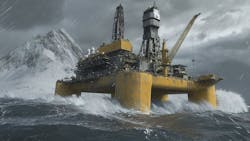Report: Next few months could be volatile for offshore rig market
By Bruce Beaubouef, Managing Editor
Evercore ISI’s latest Offshore Rig Market Snapshot projects that the next few months “will likely be volatile as the broader market digests election results,” resulting in a market condition that could delay E&P spending plans for 2025.
In addition, the firm observed that “the overhang of the potential reversal of OPEC+ cuts could bring further uncertainty.”
The firm noted that 3Q 2024 “ended with no surprises, with much of the themes in the offshore market remaining intact.”
The oilfield investment consulting firm said that “the near-term outlook suggests activity will likely stay flattish into 1H25 broadly across deepwater basins, with a growth reacceleration anticipated late 2025 and early 2026 as incremental floater demand emerges in Latin America and West Africa.”
The report noted that 2024 was a “particularly heavy capex year for offshore drillers and offshore transportation companies.” The firm further said that it expects that there will be reduced capital needs for 2025 “as newbuilds have been delivered, reactivations are complete (and there are no imminent needs for reactivations), and subsea production systems and maintenance activity will be comparably lower, translating to higher cash flow.”
So despite the potential uncertainty brought about by the recent US presidential election, and possible OPEC cuts, Evercore concluded that “we believe 2025 will be broadly positive.”
The report then provided an update on what it describes as the “Big 3” offshore drillers:
Valaris remains positive on the longevity of the offshore upcycle, particularly deepwater, primarily due to the sheer size of deepwater fields and significantly improved economics. Valaris is tracking ~30 floater opportunities with contract durations of at least one year, with significant opportunities expected to emerge in offshore Africa. There are a dozen long-term opportunities in the region, which could drive incremental demand of up to four additional rigs by the end of 2026. In Latin America, Petrobras recently awarded two long-term contracts for the Roncador program and is expected to further progress with two tenders, which could add seven more rigs in the region, keeping rigs busy into 2028 and 2029. Notably, ARO Drilling (50/50 JV between Saudi Aramco and Valaris) ordered a third newbuild jackup, Kingdom 3, following Kingdom 1 and Kingdom 2, which were delivered in 4Q23 and 3Q24, respectively.
Transocean forecasts global upstream capex to remain relatively flat at ~$500 billion per year over the next several years. However, improved economics for offshore barrels continue to attract customers, with upstream spending allocated to deepwater (and ultra-deepwater) set to increase by 15% in 2026 from 12% in 2024. Transocean expects 10-15 programs, average duration of ~12 months, to emerge in Africa, particularly due to development programs in Nigeria, Angola, Ivory Coast, and Ghana (longer-term programs in Mozambique and Namibia). Petrobras is expected to award four rigs imminently, which could commence operations between late 2025 and early 2026, in addition to the three rigs, commencing early 2026, expected to be awarded for the Sepia program.
Noble completed the acquisition of Diamond Offshore and now operates a fleet of 41 offshore rigs. Noble expects incremental demand in the Golden Triangle in the latter half of 2025 and early 2026 should provide ample opportunity as commercial activity materializes for rigs driving the whitespace, such as the Voyager, Venturer, Deliverer, and Globetrotter I and Globetrotter II. The longer-term fundamentals remain strong, with upstream spending favoring deepwater (and ultra-deepwater), which is further supported by 100+ rig years of open demand for floaters.
About the Author
Bruce Beaubouef
Managing Editor
Bruce Beaubouef is Managing Editor for Offshore magazine. In that capacity, he plans and oversees content for the magazine; writes features on technologies and trends for the magazine; writes news updates for the website; creates and moderates topical webinars; and creates videos that focus on offshore oil and gas and renewable energies. Beaubouef has been in the oil and gas trade media for 25 years, starting out as Editor of Hart’s Pipeline Digest in 1998. From there, he went on to serve as Associate Editor for Pipe Line and Gas Industry for Gulf Publishing for four years before rejoining Hart Publications as Editor of PipeLine and Gas Technology in 2003. He joined Offshore magazine as Managing Editor in 2010, at that time owned by PennWell Corp. Beaubouef earned his Ph.D. at the University of Houston in 1997, and his dissertation was published in book form by Texas A&M University Press in September 2007 as The Strategic Petroleum Reserve: U.S. Energy Security and Oil Politics, 1975-2005.

